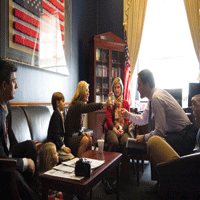Telling stories, especially personal ones, can be a powerful way to change the way people think. The National Hemophilia Foundation (NHF) held its largest Washington Days advocacy event in the history of the organization February 27–March 1, 2013. More than 300 members of the bleeding disorders community gathered in Washington, DC, to tell their stories to their congressional representatives and to ask for support on pressing issues that affect them.
Each year, NHF’s public policy team assesses upcoming legislation that members of the community need to address. In 2013, advocates asked their representatives to continue funding federal hemophilia programs through the Centers for Disease Control and Prevention (CDC) and the Health Resources and Services Administration (HRSA) Maternal Child Health Bureau, and to support the Patients’ Access to Treatment Act. Although the money that federal hemophilia programs receive is a minuscule part of the overall budgets of the CDC and HRSA, it is important to protect these programs—especially because the CDC and HRSA budgets are cut nearly every year. Advocates stressed that cutting funding to these programs would have a big impact on people with bleeding disorders.

Raymond, Lexi and Devin Banks
watch as Jennifer Banks of
Connecticut shows Devin’s
clotting factor product to
Rep. Jim Himes (D-CT).
The Patients’ Access to Treatment Act would prohibit insurance companies from designating specific medications as tier IV drugs. Most commercial health insurers categorize drugs by tier: tier 1 for generics, tier II for name brands and tier III for name-brand drugs not included on their formulary lists. The percentage paid by patients increases with each tier. Some insurers have established a fourth tier, which includes biologics and other drugs requiring special administration, for costly medications used by smaller numbers of patients. Typically, patients pay a percentage of the cost for tier IV drugs, often 25% to 33%. This would make tier IV drugs—which include clotting factor—unaffordable for most people.
The Patients’ Access to Treatment Act was introduced in the House as H.R. 460 by Reps. David McKinley (R-WV) and Lois Capps (D-CA). Before the advocates met with their legislators, the bill had 18 co-sponsors. Washington Days advocates asked their representatives to co-sponsor the bill and their senators to introduce a Senate version.

Miguel Izquierdo, Luis Jimenez
and Sergio Covarrubias of Mexico,
with NHF Board Chair Jorge de la
Riva (second from left). The Mexican
delegates attended Washington
Days to learn from NHF’s advocacy
program.
For many people, the chance to meet with their representatives was exhilarating. First-time attendee Lisa Brasher, who is from Grenada, Mississippi, and has a son with hemophilia and two daughters who are carriers, described herself as “addicted” after her first day on the Hill. “For the first time in a long time, I feel like I’ve really accomplished something,” she said. Brasher met with her representatives’ aides and planned to follow up when she returned home. “In Mississippi, there are ways of getting people to listen to you. I’ll go to their home office and we’ll have ‘tea on the porch,’” she said.
The day after NHF’s advocates met on the Hill, five representatives agreed to co-sponsor the bill. Brasher’s senator, Roger Wicker (R-MS), has a meeting scheduled in his Mississippi office to hear her story himself. That’s the power of a personal story.

